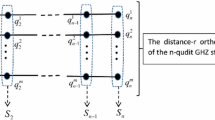Abstract
In a conventional quantum (k, n) threshold scheme, a trusted party shares a secret quantum state with n participants such that any k of those participants can cooperate to recover the original secret, while fewer than k participants obtain no information about the secret. In this paper we show how to construct a quantum (k, n) threshold scheme without the assistance of a trusted party, who generates and distributes shares among the participants. Instead, each participant chooses his private state and contributes the same to the determination of the final secret quantum state.
Similar content being viewed by others
References
Blakley, G.R.: Safeguarding cryptographic keys. In: Proceedings of National Computer Conference, pp. 313–317. AFIPS, New York (1979)
Shamir A.: How to share a secret. Commun. ACM 22, 612–613 (1979)
Ingemarsson, I., Simmons, G.J.: A protocol to set up shared secret schemes without the assistance of a mutually trusted party. In: Advances in Cryptology—Proceedings of Eurocrypt’90, pp. 266–282. Springer, Berlin (1991)
Pedersen, T.P.: A threshold cryptosystem without a trusted party. In: Advances in Cryptology— Proceedings of Eurocrypt’91, pp. 522–526. Springer, Berlin (1991)
Jackson, W.-A., Martin, K.M., O’Keefe, C.M.: Efficient secret sharing without a mutually trusted authority. In: Advances in Cryptology—Proceedings of Eurocrypt’95, pp. 183-193. Springer, Berlin (1995)
Hillery M., Bǔzek V., Berthiaume A.: Quantum secret sharing. Phys. Rev. A 59, 1829–1834 (1999)
Karlsson A., Koashi M., Imoto N.: Quantum entanglement for secret sharing and secret splitting. Phys. Rev. A 59, 162–168 (1999)
Cleve R., Gottesman D., Lo H.-K.: How to share a quantum secret. Phys. Rev. Lett. 83, 648–651 (1999)
Gottesman D.: Theory of quantum secret sharing. Phys. Rev. A 61, 042311 (2000)
Bandyopadhyay S.: Teleportation and secret sharing with pure entangled states. Phys. Rev. A 62, 012308 (2000)
Nascimento A.C.A., Mueller-Quade J., Imai H.: Improving quantum secret-sharing schemes. Phys. Rev. A 64, 042311 (2001)
Guo G.P., Guo G.C.: Quantum secret sharing without entanglement. Phys. Lett. A 310, 247–251 (2003)
Lance A.M., Symul T., Bowen W.P., Sanders B.C., Lam P.K.: Tripartite quantum state sharing. Phys. Rev. Lett. 92, 177903 (2004)
Xiao L., Long G.L., Deng F.G., Pan J.W.: Efficient multiparty quantum-secret-sharing schemes. Phys. Rev. A 69, 052307 (2004)
Tokunaga Y., Okamoto T., Imoto N.: Threshold quantum cryptography. Phys. Rev. A 71, 012314 (2005)
Zhang Z.J., Li Y., Man Z.X.: Multiparty quantum secret sharing. Phys. Rev. A 71, 044301 (2005)
Deng F.G., Zhou H.Y., Long G.L.: Bidirectional quantum secret sharing and secret splitting with polarized single photons. Phys. Lett. A 337, 329–334 (2005)
Takesue H., Inoue K.: Quantum secret sharing based on modulated high-dimensional time-bin entanglement. Phys. Rev. A 74, 012315 (2006)
Zhang Z.J.: Multiparty secret sharing of quantum information via cavity QED. Opt. Comm. 261, 199–202 (2006)
Yu I.C., Lin F.L., Huang C.Y.: Quantum secret sharing with multilevel mutually (un)biased bases. Phys. Rev. A 78, 012344 (2008)
Wootters W.K., Zurek W.H.: A single quantum cannot be cloned. Nature 299, 802–803 (1982)
Aigner M., Ziegler G.M.: Proofs from the book, pp. 7–10. Springer, Berlin (2006)
Crépeau, C., Gottesman, D., Smith, A.: Secure multi-party quantum computation. In: Proceedings of the 34th Annual ACM Symposium on Theory of Computing. pp. 643–652. ACM, New York (2002)
Ben-Or, M., Crépeau, C., Gottesman, D., Hassidim, A., Smith, A.: Secure multiparty quantum computation with (only) a strict honest majority. In: Proceedings of 47th Annual IEEE Symposium on the Foundations of Computer Science, pp. 249–260. IEEE, Los Alamitos (2006)
Author information
Authors and Affiliations
Corresponding author
Rights and permissions
About this article
Cite this article
Li, Q., Long, D.Y., Chan, W.H. et al. Sharing a quantum secret without a trusted party. Quantum Inf Process 10, 97–106 (2011). https://doi.org/10.1007/s11128-010-0180-3
Received:
Accepted:
Published:
Issue Date:
DOI: https://doi.org/10.1007/s11128-010-0180-3




